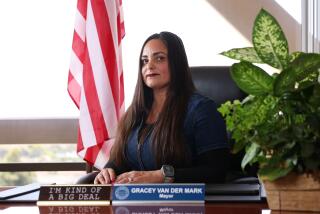Court Backs Law Against Panhandling
- Share via
SAN FRANCISCO — In a victory for Los Angeles and other California cities that want to control public begging, the California Supreme Court on Thursday made it more difficult for opponents to block anti-panhandling laws in court.
Several state and federal courts have prevented cities, including Los Angeles, from enforcing anti-begging laws on the grounds that they violate the California Constitution. The high court, however, ruled that the state Constitution is not an automatic bar and established a more lenient legal standard for reviewing such laws.
Thursday’s 5-2 decision said Los Angeles’ anti-panhandling law, passed in 1997 but never enforced, is not “constitutionally suspect,” paving the way for Los Angeles and other cities to try to revive bans on soliciting money in public places.
“The regulation of solicitation long has been recognized as being within the government’s police power,” Chief Justice Ronald M. George wrote for the court.
Opponents of Los Angeles’ ordinance said they will continue to fight the law on federal constitutional grounds.
The city ordinance would prohibit all sorts of solicitations, including the sale of Girl Scout cookies, the hawking of newspapers or bell ringing by the Salvation Army, at a variety of specified locations. They include near ATMs, outside dining areas and at bus stops. Aggressive, intimidating solicitations and approaching motorists would be banned anywhere in public.
Peter Eliasberg, an attorney with the ACLU of Southern California, complained that the ruling has “the potential to interfere with the individual rights of people who are less fortunate.”
Although the decision will probably lead to the removal of a federal injunction against the ordinance, strong constitutional arguments remain to overturn the law or at least major portions of it, said the ACLU lawyer, who is representing various groups, including the homeless, in the case.
A federal judge in 1997 temporarily blocked the Los Angeles ordinance on state constitutional grounds. The 9th U.S. Circuit Court of Appeals later asked the California Supreme Court to determine whether the California Constitution offers stronger protections for panhandling than the federal constitution.
By deciding that the state Constitution offers no greater protection, the state high court has made it easier for cities to fend off legal challenges to their panhandling laws.
“This decision is an important step in enabling cities to revitalize their downtown areas,” said Kent Scheidegger, legal director of the conservative Criminal Justice Legal Foundation.
Los Angeles Deputy Dist. Atty. Candice Horikawa also praised the ruling. “They established a standard that will be much easier for us,” she said.
Justices Stanley Mosk and Joyce Kennard dissented in Thursday’s decision, Los Angeles Alliance for Survival vs. City of Los Angeles, S073451. Mosk said Los Angeles cannot justify “a categorical prohibition against all solicitation . . . on the basis that it is inherently disruptive.”
“Individuals in public places cannot expect the same degree of protection from contact with others as they are entitled to in their own homes,” he said.
Kennard complained that the state high court is developing an insensitivity to free speech.
“Today [the court] approves an ordinance that censors disfavored speech in public places,” Kennard wrote. “But our right to free speech means little unless it also protects speech we find offensive or annoying.”
The case must now be sent back to the federal appeals’ court for final resolution.
More to Read
Sign up for Essential California
The most important California stories and recommendations in your inbox every morning.
You may occasionally receive promotional content from the Los Angeles Times.











